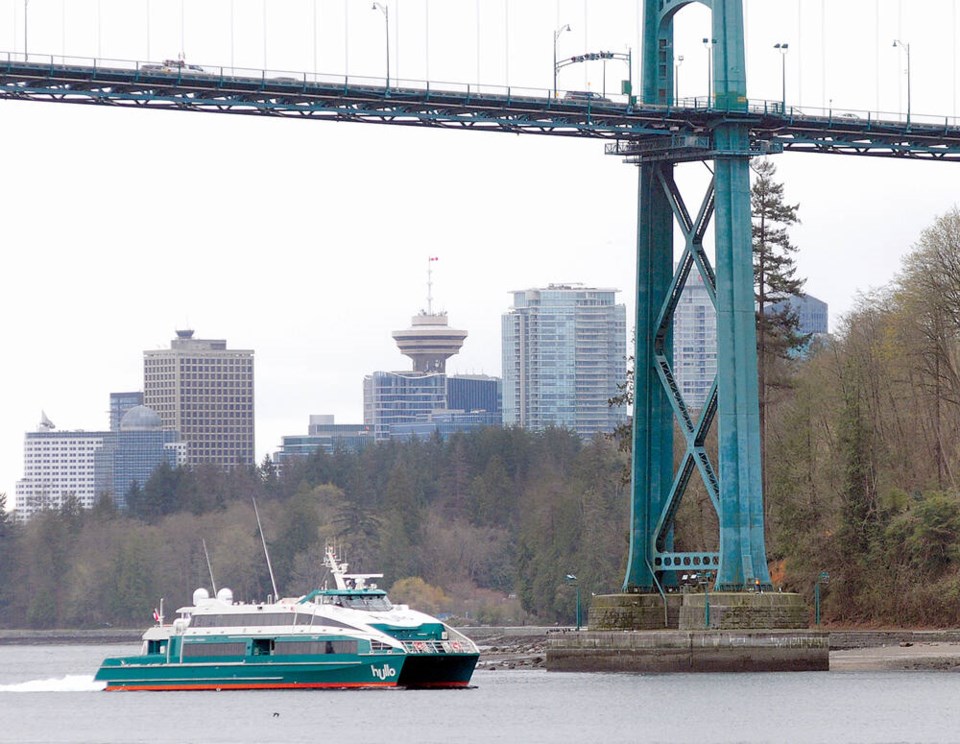As investigators look to untangle how a reported power failure caused a large shipping vessel to topple the Francis Scott Key Bridge in Baltimore, it’s only natural for people living on the North Shore to consider what could happen in a similar event close to home.
That’s according to Bowinn Ma, North Vancouver-Lonsdale MLA and B.C.’s Minister of Emergency Management and Climate Readiness, who says that the likelihood of such a vessel striking either the Lions Gate or Ironworkers Memorial bridges is extremely low.
But considering the massive operational consequences that a single pothole on a North Shore bridge can have, the question looms: how prepared are we if a crucial span over the Burrard Inlet goes out?
Much of the response to such a disaster would depend on what actually happened, with the impacts of the situation guiding the response, Ma said.
“The provincial and local governments maintain emergency response plans for all sorts of situations, although you can never truly predict all of the emergencies that could happen,” she said.
Any immediate lives that need saving would be No. 1 priority, which would be followed by assessing how long a bridge would be unusable while also taking action to secure critical supplies and services, Ma said. The province would take an “all hands on deck” approach in supporting first responders and local authorities, she added, with the Ministry of Transportation and Infrastructure taking the lead.
The province would also have access to funds under the Emergency and Disaster Management Act, Ma said.
At the local level, there are established partnerships that would secure the movement of goods and services should a bridge cease to be an option, explains Emily Dicken, director of North Shore Emergency Management.
“Bridges are one piece of critical infrastructure for us, but we recognize that there are various other points of port entry on the North Shore, as well as other routes, [namely] the Sea to Sky corridor,” she said.
“We work really closely with all of the heavy industry along the port space,” Dicken said. “We also work really closely with TransLink [and Royal Canadian Marine Search and Rescue], who can move goods and services, and there are fully exercised plans in place where we’ve gone as far as to exercise what it looks like to move goods, services and human resources around, on and off the North Shore.”
Planned safety upgrades to North Shore bridges in design phase, province says
Following a 2015 risk assessment of the Lions Gate and Ironworkers bridges, the province determined three years later in 2018 that they didn’t meet new federal safety standards and would require safety enhancements.
The Burrard Inlet spans are classified as Class I bridges of “critical importance,” where the maximum annual rate of collapse risk factor is one in 10,000 years. Currently, the local bridges meet Class II regular importance standards, which carry a risk factor of one in 1,000.
Six years ago, plans were announced to build up a rock berm around the base of the Lions Gate’s south tower. The province also declared plans to install a steel barrier to protect the Ironworkers’ trusses, and in-water structures to redirect a ship drifting off course back to the centre of the channel.
Last year, the Ministry of Transportation and Infrastructure said it was seeking engineering firms to design those in-water structures. When asked more recently, the ministry said the work is now in the design phase.
“The ministry is progressing with plans to retrofit the Lions Gate and Ironworkers Memorial bridges, to strengthen their resilience in the extremely unlikely event of vessel impact,” the ministry said in an emailed statement. “Detailed design work on this is currently underway.”
“These measures will complement the stringent vessel transit procedures put in place by the Vancouver Fraser Port Authority for the safe movement of people and goods in the Burrard Inlet.”
Both the Lions Gate and Ironworkers Memorial bridges have operated safely since opening in 1938 and 1960, respectively, the ministry added.
The ministry did not provide a timeline for when the new structural upgrades are expected to be done.




